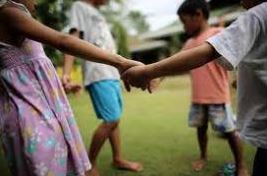
Children are the wealth of the nation despite a few harrowing incidents recently pointing otherwise.
Nobody can deny that the nation’s wealth has been at the receiving end of what no child and human being should be subjected to. Democratic South Africa’s first President Nelson Mandela had a lot to say about the wellness and welfare of children.
“The children must, at last, play in the open veld, no longer tortured by the pangs of hunger or ravaged by the disease or threatened with the scourge of ignorance, molestation and abuse, and no longer required to engage in deeds whose gravity exceeds the demands of their tender years,” he said in 1993.
The magnitude of what he said back then still rings true today.
Last month, the Gauteng Health Department confirmed the deaths of five children in Soweto, the West Rand and Roodepoort due to suspected food poisoning. Media reports also pointed to food poisoning deaths in the North West.
This after the children allegedly consumed poisonous food from local shops and vendors.
South Africa recently marked National Children’s Day, a day government declared to be commemorated on the first Saturday of the month of November.
Commemorated annually, the day highlights progress being made towards the realisation and promotion of the rights of children.
Section 28 of the country’s Constitution states the rights that every child has the right to. In turn, the state must respect, protect, promote and fulfil the rights in the Bill of Rights.
Children under the age of 18, have a right to basic nutrition, shelter, basic health care services and social services. Among others, the Constitution also makes provision for children to be protected from maltreatment, neglect, abuse or degradation.
The news of the children’s deaths shocked the nation and also placed the spotlight on spaza shops. The Gauteng provincial government moved to intensify its awareness drive where it engaged locals and shared the importance of checking food expiry labels, among others.
As it takes a village to raise a child, Cabinet also expressed concern while adding that it was encouraged by law enforcement efforts to enforce food safety compliance. Efforts taken include the Johannesburg Metro Police Department and the City of Johannesburg’s, environmental health practitioners conducting inspections to check compliance with city bylaws. In addition, the City of Tshwane and its health officials and the metro police also embarked on a by-law enforcement inspection where two of the spaza shops visited were shut down.
In addition, the outcomes of a recent government-led International Migration Workshop included the introduction of omnibus by-laws to address challenges relating to trading and the enforcement of business by-laws by municipalities and traditional authorities.
It also focused on curbing the effects of illegal immigration, including the operations of spaza shops and there will also be immediate joint inspections of businesses, in particular spaza shops, by various government departments including Home Affairs immigration inspectorate teams to enforce compliance with applicable laws.
The audit of spaza shops in villages and townships, and mechanisms to register them will be undertaken by both traditional leaders and municipalities.
There are also efforts to support traditional authorities to keep a record of foreign nationals in their communities while business licensing legislation is being amended to support those wishing to trade in the informal sector.
While the lives that have been lost cannot be brought back, inspection blitzes carried out by the Cities of Tshwane and Johannesburg as well as the outcomes of the migration workshop resolve to ensure the safety of children.
One can also not ignore the fact that communities have placed the blame - whether warranted or not - of the selling of expired foods at the door of foreign nationals operating spaza shops and the record keeping of foreign nationals in communities will go some way in allaying suspicions of one another.
The alleged poisonings brought to the fore the ire of communities and rightly so. Communities were once more reminded of previous and dare I say ongoing, spates of the brutal rapes, murders and mutilation of children.
We ought to put a stop to these hair-raising incidents and raise a generation of children that protect their peers.
While legislation such as the Children’s Act exist and sets out principles relating to the care and protection of children including making provision regarding children's courts, all of these incidents remind us that the safety of children requires the presence of all of society.
World Children’s Day is being commemorated on 20 November to promote international togetherness, awareness among children worldwide, and improve children's welfare. It was first established in 1954. According to the UN since 1990, the day also marks the anniversary of the date that the UN General Assembly adopted both the Declaration and the Convention on children's rights.
If we are to see a better future, the protection of children should urgently be everyone’s business.
*Neo Semono is a features writer at www.sanews.gov.za
-SAnews.gov.za


